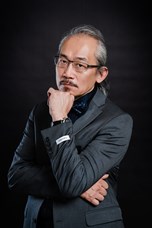Menu

Earlier this month The RCSEd Faculty of Dental Trainers welcomed its first Fellow from Taiwan, Prof. Eddie Lai, who is an Associate Professor and Head of Orthodontics and Dentofacial Orthopaedics at the National Taiwan University Hospital.
Prof. Lai is currently the President of the Taiwan Association of Orthodontics and has been a leader in dental education and public service in Southeast Asia for over a decade. His achievements include the editing of the first textbook of family dentistry, as well as the standardisation of the accreditation for dental teaching in hospitals. He has won several awards for his achievements: the Dental Education Contribution Award of the Association for Dental Sciences of the Taiwan, ROC (2017), a Silver Award in Dental Education of Taiwan Dental Association (2017), the Outstanding Teacher Award of Taiwan Dental Association (2015), and a Dental Education Contribution Award of The Association of Family Dentistry (2015).
We spoke with Prof. Lai and learned more about his Fellowship with the FDT and how he is helping promote recognition of dental trainers and educators in Southeast Asia on behalf of the College.

What motivated you to get involved with the RCSEd Faculty of Dental Trainers?
"I met the Director of the FDT, Dr Sarah Manton, when she visited Malaysia at the Council meeting of the South East Asia Association for Dental Education (SEAADE), where she spoke about the College and Faculty of Dental Trainers. As a councillor of SEAADE and country representative of Taiwan, I resonate with the RCSEd Faculty of Dental Trainers’ mission to enhance patient care and safety by promoting the highest standards of training in dentistry and supporting trainers in developing their roles. The key aim of the Faculty is to facilitate support for the attainment of its published Standards for Dental Trainers across the dental team through education, mentoring, and opportunities to network with other trainers that I need. During the COVID-19 pandemic, undergraduate dental education has changed drastically to accommodate the “new normal”. Teaching and learning have moved to online platforms, while laboratory and clinical practice have been postponed. Students and educators alike are continuing to struggle to adapt to this new way of education. The traditional model of knowledge assessment has been challenged by recent changes in technology, the economy, and public health policy. I believe the COVID-19 pandemic has also rapidly accelerated the need to change assessment strategies. Dental teachers, educators, and dental school administrators have now been forced to come up with new assessment approaches."
What will your fellowship with FDT mean for your dental career?
"For my dental career, Fellowship with the FDT will help me promote the advancement of dental education and research in my country and South East Asia, as well as support me in my collaboration with dental educators, educators of other health care professions and educators in the community of higher education. It will help me establish and maintain links with government and other agencies to promote and support the development and improvement of dental education and research and to advise on dental education programmes."
What got you interested in orthodontics and dentofacial orthopaedics and what advice would you give to dental undergraduates and postgraduate dentists looking to pursue specialty training?
"When I was an undergraduate student, my mentor taught me to “treat the whole, not treat the hole” so at that time, I thought orthodontics and dentofacial orthopaedics was one of the specialties to achieve this purpose."
How has dental education changed since your days as a student?
"Today, online learning is the main track in dentistry and in order to combine the strengths of traditional education and digital learning, our school adjusted its structure and set up the ‘Digital Dental Skill Training Centre’ at the end of 2019. The new structure was created in a bid to utilise the experiences and resources of the Center for Teaching and Learning Development accumulated over the past ten years, and to facilitate collaboration between the two units to effectively promote the development of digital learning in the school. As a head of the Orthodontics Department of National Taiwan University and President of the Taiwan Association of Orthodontists, I think the ability to utilise the latest technology is an added competency for the new generation of general dental practitioners and orthodontists."